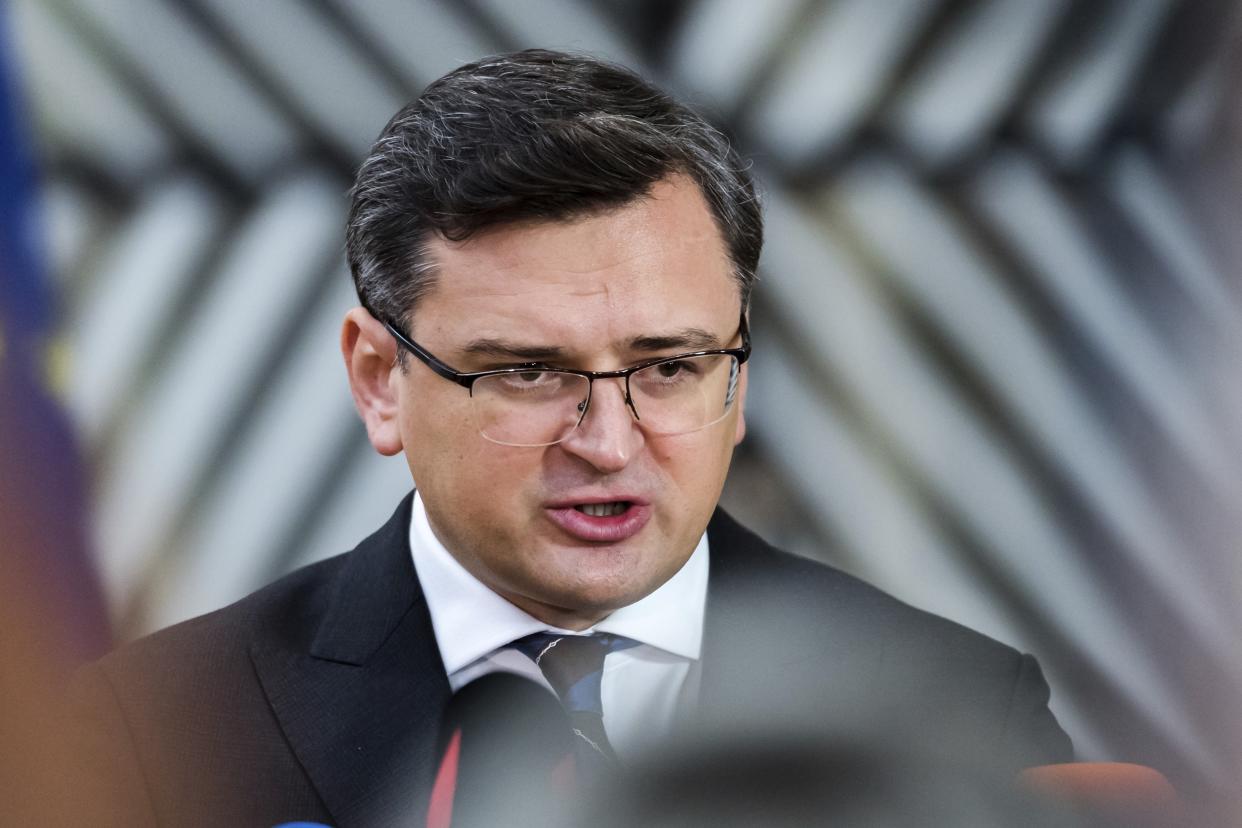Exclusive: Ukraine’s Foreign Minister Says ‘We Don’t Need Russia’ To Resume Grain Shipments

- Oops!Something went wrong.Please try again later.
Ukraine's Foreign Minister Dmytro Kuleba speaks with journalists as he arrives for a round table meeting of the Eastern Partnership at the European Council building in Brussels on Nov. 15, 2021. Credit - Geert Vanden Wijngaert,—AP
Ukraine is ready to restart grain exports despite Russia’s naval blockade of the Black Sea, Ukrainian Foreign Minister Dmytro Kuleba said on Tuesday, as Russian forces launched a fresh barrage of missiles at the Ukrainian ports where many of the grain shipments originate.
“We are ready to take any risks,” Kuleba said in an exclusive interview with TIME a day after Russia suspended its participation in the year-old Black Sea Grain Initiative which has allowed Ukraine’s vast supplies of grain to reach global markets despite the ongoing Russian war against Ukraine. “I think our message to the world is simply: We don’t need Russia.”
Kuleba’s declaration showed Kyiv’s willingness to call Moscow’s bluff amid the standoff in the Black Sea, potentially moving ahead with the export of grain despite the threat of a Russian attack on civilian cargo ships. With the price of grain spiking worldwide, it also highlights the stakes for the international community, including Turkey and the United Nations, which brokered the grain deal last year.
On Monday, after withdrawing from the grain deal, the Kremlin warned that cargo ships face “certain risks” when leaving Ukrainian ports in “immediate proximity to the area of hostilities.” If shipments resume without a formal agreement involving Russia, “then these risks should be taken into account,” Kremlin spokesman Dmitry Peskov told reporters on Monday. On Wednesday Russia’s defense ministry declared that any ships sailing to Ukrainian ports will be treated as “potential carriers of military cargo,” while the countries responsible for these shipments will be considered “involved” in the war on the Ukrainian side.
In his interview Tuesday with TIME in New York City, Kuleba acknowledged the risk that a commercial vessel carrying thousands of tons of grain could be “drowned by a Russian mine or a Russian missile.”
“Is this the risk you are ready to take on your shoulder? This is the question that people here at [United Nations] headquarters, and in Ankara, have to answer,” Kuleba said at Ukraine’s mission to the U.N. “We don’t want to put anyone’s life at risk at our discretion,” he added. “If you ask us, are you ready to test it? We are. But we have to engage with others on minimizing risks.”
The last time Russia withdrew from the Black Sea grain deal at the end of October, Ukraine also announced that it would continue shipments with support from Turkey and the U.N. Within a few days, Russia backed down and rejoined the agreement, allowing the exports to resume. This time, Kuleba says, the same kind of brinkmanship might not change the Russian position so easily. “It worked once. We will see whether it will work again,” he says. “I don’t see that happening.”
For Russia, Kuleba said, there appears to be little advantage in returning to the deal. The disruption of Ukrainian exports is almost certain to cause a continued spike in grain prices on the global market. Prices of wheat, corn and soybeans all climbed on Monday in response to the news of Russia’s decision not to renew the deal. Wheat futures soared by 3%, setting off renewed concern of food shortages and inflation, especially in parts of Africa and Asia that rely on Ukrainian grain supplies. The global benchmark for wheat prices went up by as much as 9% on Wednesday after the Russian defense ministry statement.
Russia stands to benefit from these developments, Kuleba says. “By terminating the grain deal, they kill two hares with one shot.” Not only does the move threaten a vital source of revenue for Ukraine’s war-battered economy, it also opens the door for Russia to sell its own grain at higher prices on the global market. “Behind all of this diplomatic smoke screen, Russians are just trying to make more money,” he says.
In a statement on Tuesday, the Russian defense ministry said that its latest wave of missile attacks on two Ukrainian port cities, Odesa and Mykolaiv, were “a mass revenge strike” in response to an explosion that damaged Russia’s bridge to Crimea, a region of Ukraine it has occupied since 2014.
Ukraine has not claimed responsibility for the attack on the bridge but officials in Kyiv consider it a legitimate target, as Russia uses it to supply military forces involved in the invasion of Ukraine. “Any illegal structures used to deliver Russian instruments of mass murder are necessarily short-lived,” Mykhailo Podolyak, an adviser to the Office of the Ukrainian President Volodymyr Zelensky, said in a tweet on Tuesday.
